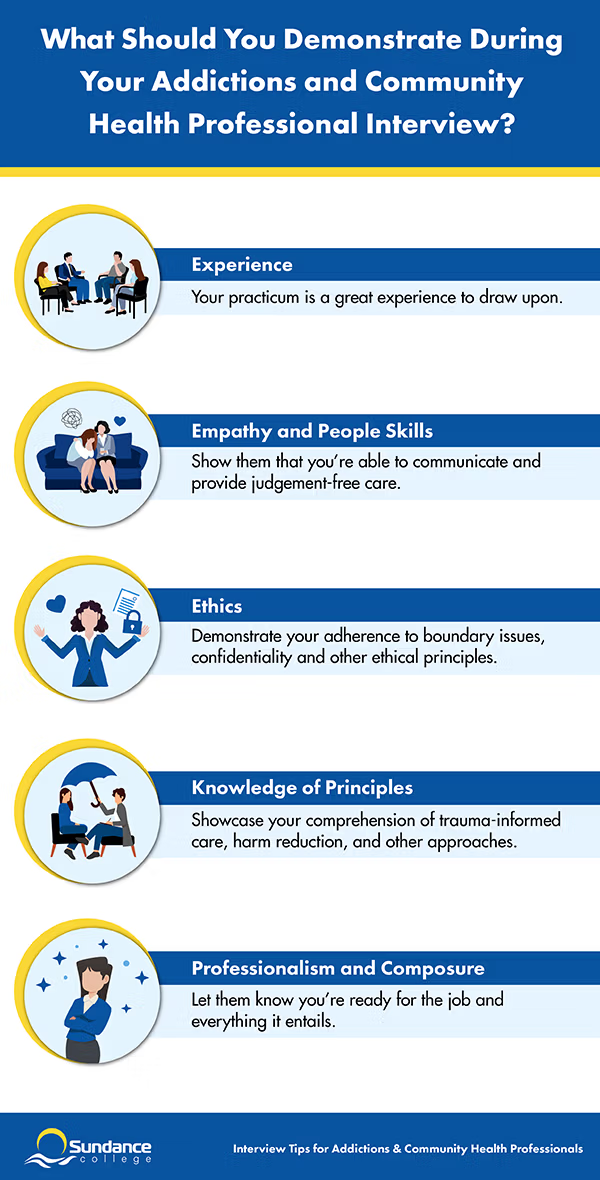Blog / Interview Tips for Addictions & Community Health Professionals
Interview Tips for Addictions & Community Health Professionals

Addictions and Community Health Professional Diploma
- Addictions Worker
- Youth Support Worker
- Family Support Worker
- Drop-in Centre Worker
Table of Contents
Whether you’re preparing for an interview or investigating opportunities, it’s important to understand what employers are looking for.
People who hire addictions and community health professionals value a good understanding of ethics, counseling strategies, relapse intervention, and trauma-informed care, along with hands-on experience. Let’s explore some sample questions and answers.
Understanding the Role of an Addictions and Community Health Support Worker
As an addictions and community health professional, you’ll use your compassion and professionalism to build a stronger, healthier community.
Making this happen means providing addictions support, helping clients improve their mental health, and participating in community outreach. You could even be providing rehabilitation support, or relapse intervention.
This field currently needs people in a variety of roles. You might find yourself working in addictions, youth support, family support, a drop-in centre, or substance abuse. In each of these cases, you’ll be helping people move forward and improve their lives, one connection at a time.
Most Common Interview Questions for Addictions & Community Health Professionals
During your interview you’ll be asked a series of questions that help employers understand your experience, ethics, motivation, and approach to addictions and community health support work.
Here are the most common questions as well as sample answers that will help you stand out and get hired.
Describe a time when you supported a client through a difficult moment.
When an employer asks this, they’re looking to see how you respond when someone becomes distressed. They’re looking for examples of calm communication, trauma-informed care techniques, and your ability to create a safe environment for the client.
Sample Answer:
“During my practicum at a community mental health centre, I was completing an intake with a new client who became visibly agitated and began pacing when I asked some sensitive questions.
Recognizing signs of distress, I recalled my training in interview and counselling strategies and led with empathy. I paused the conversation, kept my voice steady, and gave her a moment to settle.
I listened carefully in order to validate the client’s feelings. I slowed the process down and allowed her to set the pace so that she felt safe with the interaction. When she was ready, I used simple grounding strategies we learned in my training to help her re-centre. I drew on core counselling skills such as motivational interviewing and reflective listening, so that she felt heard and understood without adding pressure.
This gave her emotions time to settle. Her demeanor changed and we continued the intake more comfortably.”
This question is designed to tell employers how you handle the moments that determine whether a client stays engaged or shuts down. A response like this shows that you can keep someone with you, even when the conversation gets hard. That’s what they’re looking for in an employee.
How do you maintain boundaries while building trust?
This question is an opportunity to show employers that you understand ethical boundaries, know how to build rapport, and value confidentiality.
Sample answer:
“During my practicum at an outreach agency, I had a particularly emotional conversation with a client. He was grateful for my attention and care, so he offered me a small gift.
I decided to be direct. I thanked him, but told him that accepting gifts presented a boundary issue, and was not permitted. I assured him that my support didn’t need to be rewarded as it was part of my job and it would be given regardless of gifts. I also expressed that it’s healthy to discuss things in an open way and reminded him that anything he told me would remain confidential.
He didn’t take offense to my answer and continued sharing with me in the future.”
Answers like this demonstrate ethics, confidence, and an understanding of boundaries. This shows employers that you’re ready to handle these types of situations with professionalism.
How do you approach working with youth or families affected by addiction?
Here’s your chance to show that you understand family dynamics and youth development in the context of addiction.
Sample answer:
“No two situations are the same, so there’s no single approach that works every time. This is especially true when dealing with youth and families. As I begin, I think back to my course teachings on tailoring interventions, understanding family context, applying harm reduction when needed, and using a client-centered, developmentally appropriate approach.
Young people present in different ways, so it’s important to be adaptable. I assess each client’s needs and determine what is developmentally and emotionally appropriate.”
This answer demonstrates that you understand family support principles, that you’re adaptable, and that you’re able to apply addiction recovery concepts with compassion and professionalism.

What motivates you to work in mental health and addictions?
Employers want to know that you’re aware of the social impact of the job and that you’re motivated by compassion and service. They’re also looking to see that your career motivation aligns with ethical and sustainable practice.
Sample answer:
“During high school I mentored a younger child and saw firsthand how my efforts led to growth. I was inspired.
During my practicum at a community mental health centre I practiced the interviewing and counselling strategies I’d learned in my diploma program. This helped me make the clients feel appreciated and cared for, which only increased my personal drive to help.
I believe that everyone is deserving of stability and dignity. I want a career that allows me to make a difference and help destigmatize mental health issues.”
This answer is authentic, showing employers that you’re aware of the real-world impact it can create and that you possess the emotional maturity to excel.
How do you handle a client experiencing relapse or crisis?
Employers want to know that you can react calmly and effectively to stressful situations. Can you follow protocol while combining empathy with professionalism?
Sample answers:
For this answer, let’s use the STAR technique to demonstrate a relevant experience.
S – Situation
“During my practicum at a community addictions centre, a client I’d been supporting arrived visibly upset and shared that he had relapsed after several weeks of sobriety. He was worried about the consequences and felt ashamed.”
T – Task
“My responsibility was to stay calm, ensure he was safe, and support him in getting back on track using the approaches we were trained in.”
A – Action
“I used the counselling and crisis-response techniques I practiced during my training to help de-escalate the moment.
I responded with compassion, reassuring him that relapse can be part of recovery. I prioritized his safety, both emotional and physical, and maintained a steady, calming presence. I utilized a trauma informed approach in order to help him feel safe, heard, and in control of the pace of the conversation.
Once the client had stabilized, I followed the Crisis Cycle model discussed in my diploma program in order to help him recognize what led to the relapse and build a safer plan moving forward.
R – Result
By the end of our conversation, he felt calmer and agreed to re-engage with his recovery plan. My supervisor later noted that the way I applied the relapse prevention concepts, along with steady communication and empathy, helped the client regain confidence in his ability to continue forward.”
This answer demonstrates your ability to combine knowledge of principles with empathy and people skills, showing that you’re a reliable partner in these types of situations.
How would you collaborate with counsellors or social workers on a client plan?
Employers ask this question to assess your understanding of team-based care and ensure that you value communication, documentation, and shared goals.
Sample answer:
“It’s important to involve other healthcare professionals when developing a patient plan. In my practicum, I worked alongside counsellors, social workers, nurses, psychologists, and other practitioners to develop support plans for clients in early recovery. We established shared goals based on the client’s needs.
I listened in order to understand their perspectives, and shared my own observations gained through one-on-one sessions, while maintaining confidentiality.
Throughout, I reflected on the ideals of professionalism and inter-agency collaboration, I learned in my diploma program. I ensured that I understood each professional’s role and scope of practice and that my communication was clear and respectful. We used regular check-ins and accurate documentation to keep the team coordinated and client centered.
I gained a lot from their expertise and clients got to feel supported by the entire network, not just one individual.”
This answer shows employers that you understand interprofessional collaboration and that you value teamwork. It shows that you were able to adapt to the system during your practicum, giving them faith that you’ll be able to do the same again.
How do you manage your own mental well-being in this field?
Helping yourself allows you to better help others. Show them you recognize the emotional demands of this field and take responsibility for managing your well-being.
Sample answer:
“My diploma program consistently emphasized wellbeing as a core part of ethical, sustainable practice.
I regularly take time to ground and process my emotions. After challenging sessions, I find that journaling helps me debrief and reflect.
My training in ethics taught me to recognize early signs of burnout and compassion fatigue, and to maintain professional boundaries in order to avoid exhaustion. Like many mental health professionals, I also engage in my own therapy, not to discuss clients, but to manage how the work impacts me emotionally.”
This answer shows that you understand the emotional realities of the field, take responsibility for your own stability, and can protect your well-being without compromising your professionalism or client care.

What practicum experience best prepared you for this role?
Employers want to know that you understand the importance of real-world experience and that you’ve reflected on your practicum learning.
Sample answer:
“My entire diploma program experience was exciting, because I was gaining new skills and knowledge every day, but the practicum was my favourite part because it allowed me to bridge classroom learning with real-world interactions. Seeing the concepts in action was rewarding, but it was the larger experience that really stands out: adapting to a real pace, responding to unpredictability, and treating people with dignity. It confirmed my decision to pursue a career in this field.”
This tells employers you’ve already operated in real conditions in this field, not just the classroom version of the work. It shows you can handle the pace, respond to the unexpected, and stay grounded with actual clients. That’s what demonstrates to them that you’re ready for the job.
What qualities make you a strong candidate for addictions work?
Employees want to know that you can balance compassion with professionalism and that you have the interpersonal qualities that it takes to treat clients respectfully and effectively.
Sample answer:
“I’ve always been told that I’m an empathetic person. I strive to listen without judgment and meet people where they are. I’m a good communicator who can tailor my style to different people.
I am a professional who knows how to manage boundaries, respect confidentiality, and stay grounded, all while treating people with warmth.
I gained valuable knowledge during my diploma program, including different counselling strategies, relapse intervention techniques, addictions and rehabilitation support, and harm reduction. I then got to practice this knowledge during my practicum.
I’m a reliable, patient person who is adaptable and self-aware.
Finally, I’m highly motivated and eager to make a difference.”
A response like this tells employers you have the skills and the temperament for addictions work. It shows that you possess the kind of qualities that come into play when things get tense, emotional, or unpredictable. This shows that they can trust you in a frontline role.
Standing out in an interview is about giving the employer confidence that you’re ready to excel in the role. Sundance College’s Addictions and Community Health Professional diploma program will prepare you for a career in this in-demand field in under a year. The program teaches you the skills that employers are looking for, preparing you to impress in an interview.
The 44-week program includes a 7-week practicum, providing you the hands-on experience that employers are looking for. The practicum gives you experience to draw upon when formulating your interview answers, proving that you’re ready to apply your skills in a real-world situation.
In under a year, you’ll be trained in counselling strategies, recovery and rehabilitation support, and relapse intervention, readying you to work as an addictions worker, youth support worker, family support worker, drop-in centre worker, or substance abuse worker.
You’ll also benefit from the lifetime support of our Career Services team, who will assist you with resume preparation, job search planning, interview practice, and job application strategies.
Sundance College’s ACHP program is approved by the Canadian Addictions Counsellors Certification Federation (CACCF), allowing you to stand out in your field.
Sundance College graduates have not only started rewarding careers in the field but have undergone inspiring personal transformations as well. Ashley C. graduated from the Addictions and Community Health Professional diploma program. She found her experience at Sundance College motivating and believes that it had a wide-ranging positive impact on her.
“I was at a standstill in my life and I wanted to be a change in the world. The instructors, Student Services, and Career Services teams were so enthusiastic. It inspired me to become the best version of myself. You’re coming to Sundance College to help other people, but you’re also learning how to become a better version of yourself.”
Just like Ashley, graduate Jolene C. also felt compelled to make changes in her life. She followed her intuition into the diploma program and a new and rewarding career.
“I worked in the beauty industry for 20 years, but I kept seeing ads for Sundance College. The universe was telling me something. Now I work at a facility that deals with addiction, recovery, mental health, and brain injuries. Now I know that I can make people feel beautiful both inside and outside.”
These stories show the deep impact that Sundance College has had on Ashley, Jolene, and other graduates. By graduating from the Addictions and Community Health Professional diploma program, they were able to move into a new career.
To get started with your training, contact an admissions advisor and explore your options today.
Frequently Asked Questions (FAQs)
-
How can I demonstrate skills in an addictions or community health professional interview without direct experience?
Practicum experience demonstrates to employers that you’re capable of applying knowledge and transferable skills gained during coursework to real-world situations. Sundance College’s Addictions and Community Health Professional diploma program includes a 7-week practicum, which is your direct experience.
-
What if I’m asked about my weaknesses or triggers in an addictions or community health professional interview?
You might choose a manageable, realistic weakness such as taking extra time with documentation, needing time to build confidence in new environments, or hesitating to ask for help right away. Explain how you recognize the issue and what emotional regulation or professional strategies you use, such as supervision, debriefing, or mindfulness. Emphasize that you’re proactive, reflective, and focused on growth rather than perfection. This shows employers that you’re self-aware and committed to continuous development.
-
How should I talk about confidentiality in an addictions or community health professional interview?
Emphasize that confidentiality is foundational to ethics in addictions support work. Reinforce that it builds trust, safety, and respect, which are essential elements to success. Mention that you follow all applicable policies and only share details with authorized team members who are directly involved in team care. Assure them that you discuss the limits of confidentiality upfront with clients and that you maintain secure records and professional discretion at all times.
-
What if I’m in an addictions or community health professional interview, but I’ve never worked in addictions before?
Practicum examples are excellent ways to demonstrate experience. Sundance College’s Addictions and Community Health Professional diploma program includes a 7-week practicum, giving you highly-valued experience in this field.
-
What kinds of questions should I ask the employer at the end of an addictions or community health professional interview?
Asking questions to an employer as the interview closes demonstrates confidence and interest.
Ask them about professional growth and career development opportunities such as training, ongoing education, and promotions. Other questions to ask employers could focus on client care philosophy, workplace culture, and team collaboration.
Close by asking a positive question, such as “What do you find most rewarding about working in this organization?”
-
How does Sundance College prepare me for real interviews?
Sundance College diploma programs provide students with the knowledge that matters to employers in the field. Practicums give students the opportunity to apply that knowledge hands-on and gain experience that they can speak about in interviews.
Graduates also get lifetime access to Sundance College’s Career Services department, which includes one-on-one interview preparation sessions that prepare them to walk into interviews with confidence.
Related Blogs
Subscribe for more career advice
Blog Categories
Share on:
